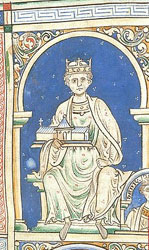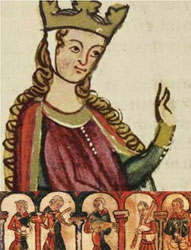On This Day: Eleanor of Aquitaine's Second Wedding
Posted on
You may remember my blog post a few weeks ago about Eleanor of Aquitaine's divorce from King Louis VII of France. Their marriage had been rocky for years, a split was virtually inevitable. Louis tried to ensure that he still had some say in Eleanor's life, by including a clause that stated that she had to ask his permission before remarrying. In this way he hoped to prevent her from allying herself with someone who would pose a danger to his kingdom.
Unfortunately for Louis, on this day, 18th May 1152, remarrying without permission was exactly what Eleanor did. Her groom was none other than Henry "Plantagenet", Duke of Normandy, and their marriage united two of the biggest duchies in France, creating exactly the kind of problem Louis wanted to avoid.
Henry Plantagenet
The young groom, who was nine years younger than the bride, was the son of Duke Geoffrey of Anjou and his wife the Empress Matilda, a princess of England by birth and technically the rightful heir to the English throne (once you got past her gender). This was another rocky marriage, but unlike Eleanor it wasn't one that would be put aside. Matilda had originally been married to Henry, the Holy Roman Emperor, and she continued to be known as "Empress Matilda" for the rest of her life. She had no children by her first husband, and his death meant that she had to leave the Empire and return to England.
Her second marriage, arranged by her father Henry I of England, was designed to prevent the Duke of Anjou from being a pain in the neck. Unfortunately Matilda hated her new husband, and he wasn't exactly taken with her. Henry had to step in several times to prevent them from becoming completely estranged. In the end though they settled down enough to conceive several children, the eldest of whom was named Henry after his grandfather.
Henry's life was dominated by the war his parents waged against Matilda's cousin, Stephen, the new King of England. To this day historians argue over whether Stephen stole the throne from Matilda, or had been privately acknowledged as Henry I's heir. Either way, Matilda and Geoffrey were not about let an opportunity pass, and while Geoffrey focused on attacking strategic points in Normandy, Matilda travelled to England and waged war with the support of her illegitimate half-brother. "The Anarchy" as it became known, went on for years and decimated the English population. In the end a compromise would be reached, Stephen would reign as King, but his heir on his death would be Matilda's son Henry.
The Marriage
Of course, there was no guarantee that Henry really would be King on Stephen's death, at the time of the wedding it wasn't even much of a consideration. Stephen had sons of his own, and the English nobility may choose to support one of them instead. But Henry had learned a lot about successful warfare from his father, and was quickly gaining a reputation for being both brave and skillful. For a woman who had a Duchy to maintain, against enemies both inside and out, he was the obvious choice. Even as Eleanor was making her way home she had already decided to marry him.
The journey back was dangerous. In the medieval period a woman's consent to a marriage was considered a technicality rather than a necessity, and
there were several men who plotted to kidnap and marry her themselves, including Henry's brother Geoffrey, so they could claim Aquitaine. But through a combination of bravery and speed, Eleanor managed to evade the plotters and reach Aquitaine safely. Henry arrived soon after, and the hasty wedding took place at Poitiers.
Louis instantly reacted by gathering a force to invade Aquitaine. Henry collected his own troops, fully supported by his wife, and was quickly successful. Louis was humiliated twice over, not only was he beaten in the field of battle, but a year later Eleanor gave birth to a healthy baby boy, giving Henry the heir that Louis had always wanted from her, and proving once and for all that if there was a fertility problem then it certainly wasn't hers.
The enmity between Louis and Henry would continue for decades, and would see Louis successfully turn Henry's sons against him, and lead to Eleanor's imprisonment for supporting them over her husband. But at least on this day in 1152, she would have started to feel safe for the first time in weeks, if not months.